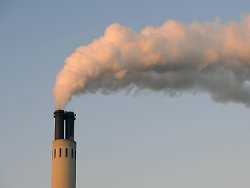Greenwashing instead of climate policy
Large companies fail to keep climate promises
02/07/2022, 4:50 p.m
More and more companies are announcing ambitious climate targets – they want to be climate neutral by 2050. But are they also implementing the necessary measures? A new study draws a bleak conclusion.
Many of the world’s largest companies are missing their emissions targets. Although companies have publicly announced net-zero targets, existing plans would reduce emissions by just 40 percent on average by 2050, new calculations by the Corporate Climate Responsibility Monitor show. The report assessed the climate targets of the world’s 25 largest companies, which are responsible for five percent of global emissions. According to the report, these companies promise a lot but rarely deliver on their climate promises.
The research analyzes the “integrity of climate commitments” to distinguish between “genuine climate policy and unsubstantiated greenwashing”. According to the report, which was written jointly with the non-governmental organization NewClimate Institute and Carbon Market Watch, some German companies are also doing very poorly. The climate goals of Deutsche Post, the car manufacturer BMW and the energy company E.ON SE are therefore “poorly honest”. On the other hand, Deutsche Telekom and Volkswagen fared slightly better.
According to the study, companies like Amazon did better, but were also very opaque when it came to their further climate measures. For example, while the online retailer is making efforts to reduce emissions from renewable energy sources in transportation, “medium- and longer-term plans for other sources of emissions remain unclear.” Other big companies like Apple, Sony and Vodafone fared slightly better. However, their climate goals were only classified as “moderately honest”.
Transparency in climate action
The report evaluates the companies based on criteria such as their climate targets, the planned extent of CO2 offsetting and the reliability of these offsetting measures. The study also analyzes the progress made in reducing our own emissions and the transparency of the targets and corporate reporting.
The result: only about half of the 25 companies provided any concrete information on how many emissions should be reduced. According to these criteria, the Maersk company performed best. The Danish logistics company has set itself the goal of being climate-neutral by 2040. However, according to the report, “proactive efforts to decarbonize ships’ emissions” are not quite enough to meet this goal.
The short-term goals of all 25 companies are of particular concern, Thomas Day, one of the study’s authors, said at a news conference. According to this, companies would only reduce their emissions by around 23 percent by 2030. That’s much less than what scientists say is needed to limit global warming to 1.5 degrees.
CO2 compensation as a loophole
Many of the companies emphasize that their climate targets are in line with recognized global standards. However, the voluntary reduction targets are largely self-enforced and certified by a small number of non-governmental organisations, whose methodology is partly criticized in the report. Although most of the companies surveyed received positive climate ratings from initiatives like the Science Based Target, those ratings often contained “loopholes,” according to the study.
According to the report, many companies rely on carbon offsets for a large part of their planned emission reductions. That’s the controversial practice of paying for projects that reduce carbon – typically by conserving forests or planting new trees – to offset greenhouse gases emitted elsewhere.
The overestimation of CO2 offsetting projects in companies’ climate plans is one reason why the reliability of the climate targets has been downgraded, according to the study’s authors at the press conference. Many of the companies surveyed have made a strong public commitment to environmental sustainability. “I would have expected more from some companies, such as Ikea, Unilever and Nestlé, given their very positive perception,” Day said in an interview with The Guardian.
